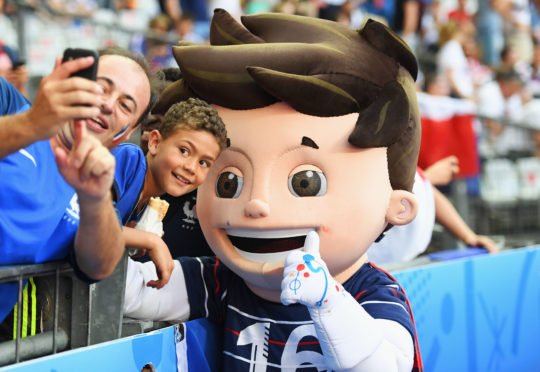
French volunteers who worked for free during the Euro 2016 football competition have told Scots to ask for wages.
The advice comes as the Union of European Football Associations (UEFA) tries to recruit a “goodwill army” – including 1,000 Scots – to carry out a range of unpaid jobs at Euro 2020.
The tournament is one of the world’s most lucrative sports events but last month we revealed how UEFA wants 12,000 volunteers to work in host cities across Europe filling roles including PR, policing pirate merchandise and escorting players to drug tests.
But French fans who gave up their time in 2016 say the roles should have wages attached.
“Justice means recruits getting paid,” said Abdelatti El Jabal, the 60-year-old head of the Paris-based Football Leisure Commission (CFL), which provided dozens of recruits in France in 2016.
“They were all hugely talented and enthusiastic, and had specialist skills,” said Mr El Jabal, a qualified referee. “Despite this, all our volunteers had to work for free. Their message to Scotland is that you should ask for a basic payment – you deserve it!”
Mr El Jabal said the prestige football competition was centered on young international footballers on millions of pounds a year.
“The salaries are astronomical, and those volunteering know this,” said Mr El Jabal. “Even if they just paid €10 [£8.80] to €20 [£17.60] a day, it wouldn’t be a big ask.
“We go on about the exploitation of children in foreign countries, but it seems to me that it is exploitation that we have here.
“Even if you just take €1 [88p] from each ticket sold, there would be a huge pot to pay the volunteers.
“Beyond being entirely fair, some kind of salary would provide motivation to do the job better, and it would make everybody feel professional.
“Yes, it’s nice to mix with international sports stars, and to be a part of a big event, but this shouldn’t preclude basic pay.”
Despite working for free, many of the French workers in 2016 signed contracts that put them off voicing their concerns to the media.
One, a 42-year-old who asked not to be named, said: “We weren’t just school kids who wanted to be ball boys. All of us were over 18, and were extremely well qualified. I have professional qualifications in website design and other computer skills, but everything I did for UEFA was for free.
“I was younger, but I really regret being exploited in this way. Something needs to change, and the Scottish people should be working hard to bring about this change.”
All of the French workers spoken to by The Sunday Post said dialogue – and not strikes – should be the key to the dispute. “It’s no use taking the job and then going on strike,” said Mr El Jabal. “The Scottish should talk to UEFA and come to a fair agreement.
“Beyond money, volunteers should be given more support in accessing coaching and training facilities.”
The Euro 2016 tournament in France brought in the equivalent of £1.66 billion for UEFA through broadcasting and commercial rights, tickets and hospitality.
UEFA says there is a tradition of using volunteers at big sports events.
Trade union: Football chiefs may break the law if they fail to pay staff
Trade unions believe European football’s governing body could be breaking the law by recruiting an army of volunteers to work for free at a football tournament next summer.
UEFA wants unpaid workers to fill a variety of roles at Euro 2020 host venues including Hampden Park in Glasgow next June.
However, Unite the Union said it was “morally unacceptable” for profitmaking organisations such as UEFA to “employ” unpaid volunteers.
Organiser Bryan Simpson said: “Section 44 of the National Minimum Wage Act is quite clear.
“The only organisations exempt from paying at least the national minimum wage are statutory bodies, charities or associated fundraising bodies.
“With a revenue of €2.78 billion in 2017/18 alone, UEFA can hardly claim to be any of these. We would urge UEFA to do the right thing by their staff and pay the living wage to all workers. They can certainly afford it.”
UEFA said: “UEFA is working with its local partners such as the Scottish FA to develop a comprehensive volunteering programme for the UEFA Euro 2020 that will deliver a great experience for volunteers and spectators alike and it will comply fully with all local laws.”

Enjoy the convenience of having The Sunday Post delivered as a digital ePaper straight to your smartphone, tablet or computer.
Subscribe for only £5.49 a month and enjoy all the benefits of the printed paper as a digital replica.
Subscribe